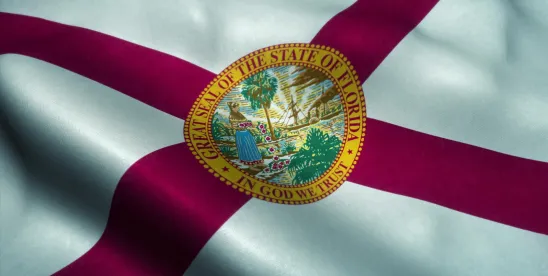| Go-To Guide: |
On April 24, 2025, the Florida House and Senate passed the Florida Contracts Honoring Opportunity, Investment, Confidentiality, and Economic Growth (CHOICE) Act, designed to foster economic growth, protect business interests, and enhance the state’s investment climate by strengthening protections for covered employers with covered noncompete and garden leave agreements. If signed by Gov. DeSantis, the CHOICE Act would take effect on July 1, 2025.
CHOICE Act Takeaways
- The Act creates a presumption that covered noncompete and garden leave agreements are enforceable and do not violate public policy as a restraint on trade;
- The Act requires courts to issue a preliminary injunction to enjoin a covered employee from violating a covered agreement; and
- The Act only allows courts to modify or dissolve a preliminary injunction if the covered employee proves by clear and convincing evidence that either the new employment will not result in unfair competition, or the covered employee did not receive the consideration described in the covered agreement.
The Act applies to:
- Covered Employers – entities or individuals who employ or engage a covered employee.
- Covered Employees – individuals (employees or contractors) who earn a salary twice the annual mean wage of the Florida county where either the covered employer has its principal place of business or where the employee resides if the covered employer’s principal place of business is outside of Florida.
- Covered Agreements – covered garden leave and noncompete agreements with either a covered employee who maintains a primary place of work in Florida (regardless of any choice of law provision); or a covered employer whose principal place of business is in Florida and the agreement identifies Florida in its choice of law provision.
Covered garden leave agreements would be enforceable if the following conditions are met:
- The covered employer advised the covered employee in writing of the right to seek counsel before execution and provides at least seven days to review the agreement;
- The time to provide advance express notice of termination (the notice period) does not exceed four years;
- The covered employer agrees to pay the covered employee her regular base salary and benefits during the notice period;
- The covered employee acknowledges in writing receipt of confidential information or customer relationships.
- The agreement provides that:
a. After the first 90 days of the notice period, the covered employee does not have to provide services to the covered employer;
b. The covered employee may engage in nonwork activities at any time, without limitation, for the remainder of the notice period;
c. The covered employee may, with permission from the covered employer, work for another employer, for the remainder of the notice period; and
d. The notice period may be reduced if the covered employer provides at least 30 days’ advance notice in writing to the covered employee.
Covered noncompete agreements would be enforceable if the following conditions are met:
- The covered employer advised the covered employee in writing of the right to seek counsel before execution and provides at least seven days to review the agreement;
- The covered employee acknowledges in writing receipt of confidential information or customer relationships;
- The noncompete period does not exceed four years; and
- The noncompete period is reduced day-for-day by any nonworking portion of the notice period, pursuant to a covered garden leave agreement, if applicable.
Notably, the Act (1) applies to nonresident covered employees employed by a Florida based employer; and (2) excludes from the definition of salary, discretionary incentives or awards and anticipated but indeterminable compensation like bonuses, tips, and commissions, among other excluded items.
The Act does not apply to:
- Healthcare practitioners;
- Standalone confidentiality or non-solicitation agreements; and
- Garden leave and noncompete agreements that do not meet the Act’s requirements. For these noncovered agreements, employers will still need to meet the requirements under section 542.335, Florida Statutes to enforce a restrictive covenant.
What about noncompete laws in states where covered employees reside?
- The Act provides that if the covered employer has its principal place of business in Florida and uses a covered agreement with a Florida choice of law provision, then “if any provision of this section is in conflict with any other law, the provisions of this section govern.”
- Covered employees residing outside of Florida (or their subsequent employers) may challenge this provision.
Enforcement of Covered Agreements
- The Act requires courts to issue a preliminary injunction against a covered employee. After a preliminary injunction is entered, the court may only modify or dissolve the injunction if the covered employee (or subsequent employer) proves by clear and convincing evidence based on non-confidential information that:
– the employee will not perform similar work during the restricted period or use confidential information or customer relationship;
– the covered employer failed to pay the salary or benefits required under a covered garden leave agreement, or failed to provide consideration for a covered noncompete agreement, the covered employer had a reasonable opportunity to cure the failure; or
– the subsequent employer is not engaged in, or preparing to engage in, a similar business as the covered employer within the restricted geographic area.
- Under a covered garden leave agreement, if a covered employee engages in gross misconduct, the covered employer may reduce the salary or benefits of the covered employee or take other appropriate action during the notice period. These acts by the covered employer would not be considered a breach of the covered garden leave agreement.
Considerations for Employers
- Review and revise existing agreements for compliance with the Act where applicable.
- Review hiring practices for (1) compliance with the notice period for covered agreements; and (2) prospective employees who may be covered by a covered agreement.
- Review confidentiality practices to ensure appropriate guardrails are in place to maintain the confidential designation for confidential information and prevent misappropriation of confidential and proprietary information and trade secrets.





 />i
/>i

